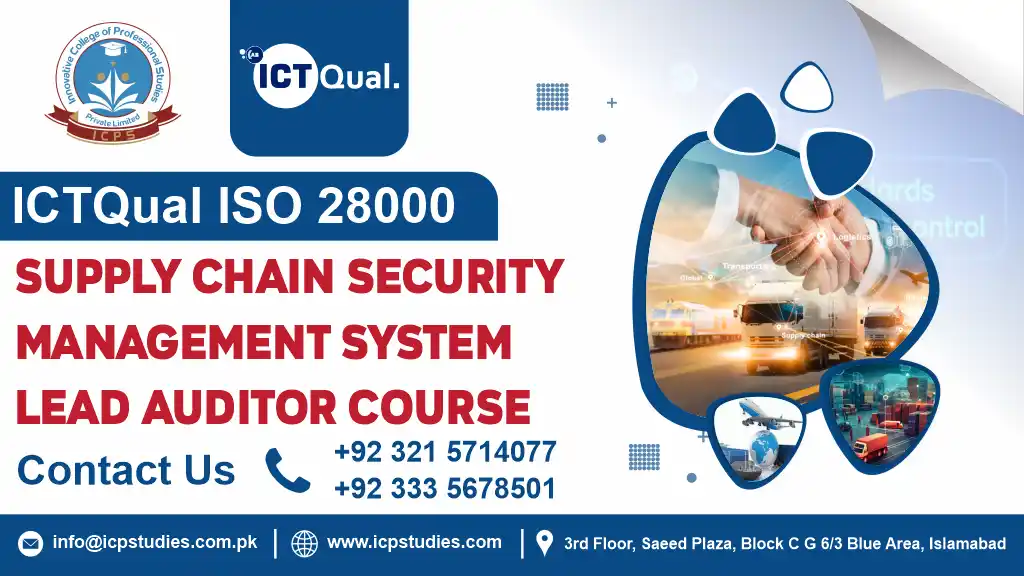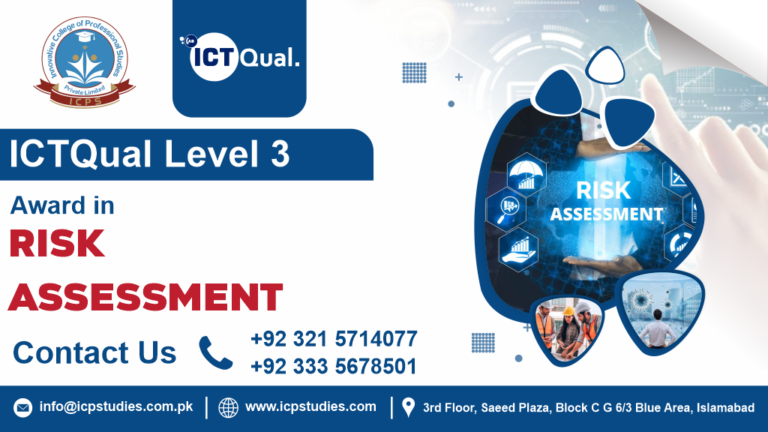In today’s global marketplace, the security of supply chains has never been more critical. With rising risks like cyber threats, geopolitical instability, and supply disruptions, ensuring robust security management has become a priority for organizations. The
equips professionals with the skills and knowledge to audit, implement, and manage supply chain security according to ISO 28000 standards. This course not only enhances professional capabilities but also strengthens an organization’s resilience against security threats.
The ICTQual ISO 28000 Lead Auditor Course is designed to provide participants with a comprehensive understanding of the international standards for supply chain security management. ISO 28000 specifies the requirements for a security management system in the supply chain, covering risk management, security assessments, and the identification of vulnerabilities that could disrupt the supply chain.
The ICTQual ISO 28000 Supply Chain Security Management System Lead Auditor Course is a comprehensive and valuable certification for anyone looking to enhance their expertise in supply chain security. By gaining a solid understanding of ISO 28000, you will be well-equipped to manage and audit security management systems, assess risks, and ensure organizational resilience. This course not only boosts your career but also strengthens global supply chains, making it an essential investment for professionals in the field of logistics, security, risk management, and compliance.
Take the step today to elevate your career and contribute to the development of safer, more secure supply chains!
All About ICTQual ISO 28000 Supply Chain Security Management System Lead Auditor Course
Course Overview
In an increasingly interconnected world, the security of supply chains is crucial to maintaining business continuity and safeguarding organizational operations. Disruptions caused by security threats, whether from cyberattacks, theft, natural disasters, or geopolitical issues, can have devastating effects on supply chain performance. To address these risks, the ICTQual ISO 28000 Supply Chain Security Management System Lead Auditor Course is designed to provide professionals with the knowledge and skills necessary to implement, audit, and manage robust security frameworks within supply chains according to international standards.
ISO 28000 outlines the requirements for establishing, implementing, operating, monitoring, reviewing, maintaining, and improving a security management system specific to the supply chain. This course offers participants an in-depth understanding of the ISO 28000 standard, along with practical auditing skills to assess the effectiveness of security measures within supply chains.
By completing this course, professionals will be equipped to lead audits, evaluate supply chain vulnerabilities, and ensure that organizations comply with best practices for security. The course is ideal for those aiming to enhance their expertise in security management, particularly in relation to supply chains, and for those who wish to pursue a career as lead auditors in this critical field.
Whether you are looking to advance in your career, support your organization’s security efforts, or achieve ISO 28000 certification, this course will provide the essential tools and knowledge to excel in the increasingly important domain of supply chain security management.
Study Units
- Introduction to Supply Chain Security Management Systems
- Core Elements of Supply Chain Security Management
- Principles of Auditing Supply Chain Security Management Systems
- Planning and Preparation for Supply Chain Security Audits
- Conducting Supply Chain Security Audits
- Reporting and Documentation of Audit Findings
- Corrective Action and Follow-Up
- Continuous Improvement and Professional Development
To ensure that participants have the foundational knowledge and skills needed to successfully complete the ICTQual ISO 28000 Lead Auditor Course, the following entry requirements are recommended:
- Basic Understanding of Supply Chain Management: Participants should have a basic understanding of supply chain operations and logistics. Familiarity with supply chain concepts such as procurement, distribution, inventory management, and risk management will be helpful.
- Knowledge of ISO Standards: While prior knowledge of ISO 28000 is not mandatory, familiarity with general ISO standards, such as ISO 9001 (Quality Management) or ISO 14001 (Environmental Management), is beneficial. This will help participants understand the structure and terminology commonly used in ISO systems.
- Experience in Security or Risk Management (Optional but Recommended): Professionals with prior experience in security management, risk assessment, or related fields will find the course content easier to grasp. Experience in auditing or compliance-related roles will also be an advantage.
- Commitment to Self-Study: This is an advanced course, and participants are expected to engage with course materials independently. A proactive approach to self-study and an interest in learning about audit processes, supply chain security, and risk management are essential.
- Proficiency in English: As the course materials and assessments are in English, participants should have a good understanding of the language to ensure they can comprehend the content and fully engage in the learning process.
- Educational Background: There are no specific formal educational requirements. However, a background in business management, logistics, security, or any related field is an advantage.
Meeting these requirements ensures that participants are prepared to maximize the value of the course and gain the skills necessary to become effective lead auditors for ISO 28000 Supply Chain Security Management Systems.
The ICTQual ISO 28000 Supply Chain Security Management System Lead Auditor Course is designed for professionals involved in supply chain management, security, risk assessment, and auditing. The course is ideal for individuals looking to enhance their skills in security management and auditing processes specific to supply chains. Below are the key groups for whom this course is particularly beneficial:
- Supply Chain Managers and Coordinators
Professionals responsible for overseeing the operations and security of supply chains will benefit from this course, as it provides in-depth knowledge of the security management systems needed to protect and optimize supply chains. - Risk Management Professionals
Those specializing in risk identification, assessment, and mitigation will gain valuable insights into how to manage security risks within supply chains. This course helps enhance their ability to evaluate vulnerabilities and create strategies for minimizing risk exposure. - Auditors
Professionals who conduct audits or are interested in becoming lead auditors will benefit from learning the specific techniques for auditing supply chain security systems. This course helps auditors build the skills necessary to evaluate and ensure compliance with ISO 28000 standards. - Security Managers and Consultants
Individuals in charge of ensuring the security of organizations or advising on security practices will find this course valuable. It equips them with the necessary expertise to guide organizations in implementing robust supply chain security measures and achieving ISO 28000 certification. - Compliance Officers
Compliance professionals tasked with ensuring that organizations adhere to industry standards will benefit from understanding how ISO 28000 aligns with global security practices and helps maintain regulatory compliance within supply chain operations. - Quality Assurance and Compliance Managers
Quality assurance professionals looking to expand their knowledge to encompass supply chain security will find this course relevant. It offers the skills to assess security protocols and ensure their alignment with ISO 28000 standards. - Consultants Specializing in ISO Standards
Consultants who assist organizations in ISO certification processes will benefit from the course as it provides detailed guidance on how to implement and audit ISO 28000 security systems, enhancing their consultancy services. - Individuals Seeking Career Advancement in Supply Chain Security
Anyone looking to move into a senior role within the field of supply chain management, security, or auditing can leverage the certification from this course to advance their careers and demonstrate their expertise in ISO 28000.
This course is a must for anyone interested in deepening their knowledge of supply chain security management and taking on leadership roles in auditing, risk management, and compliance within supply chain operations.
Learning Outcomes
Introduction to Supply Chain Security Management Systems:
- Gain a clear understanding of the concept and importance of supply chain security management systems.
- Identify the core principles and objectives that drive effective supply chain security management.
- Recognize the organizational benefits of implementing security management systems in the supply chain.
- Become familiar with the ISO 28000 standard and its role in guiding best practices for supply chain security.
Core Elements of Supply Chain Security Management:
- Explore the key components of supply chain security management as outlined in the ISO 28000 standard.
- Identify common security risks, threats, and vulnerabilities that impact supply chains.
- Analyze security measures, controls, and best practices to mitigate identified security risks.
- Develop strategies to strengthen the overall security framework of supply chain operations.
Principles of Auditing Supply Chain Security Management Systems:
- Learn the fundamental audit principles, methodologies, and techniques specific to supply chain security management systems.
- Understand the audit process and how to assess compliance with ISO 28000 requirements.
- Recognize the auditor’s role and responsibilities in ensuring effective audits of supply chain security systems.
- Acquire the skills needed to conduct audits that address the unique challenges of securing the supply chain.
Planning and Preparation for Supply Chain Security Audits:
- Develop tailored audit plans and set objectives focused on supply chain security management systems.
- Identify the criteria, scope, and select appropriate audit team members.
- Perform pre-audit activities, including document reviews and stakeholder engagement.
- Align audit planning with the organization’s supply chain security objectives and priorities.
Conducting Supply Chain Security Audits:
- Implement audit activities such as on-site visits, interviews, and examination of security protocols.
- Apply audit techniques to collect evidence and evaluate compliance with ISO 28000 security standards.
- Effectively communicate audit findings and observations to auditees and relevant stakeholders.
- Foster positive, collaborative relationships with stakeholders throughout the audit process.
Reporting and Documentation of Audit Findings:
- Prepare detailed audit reports that document findings, conclusions, and recommendations.
- Ensure that audit reports are accurate, clear, and objective, providing valuable insights for stakeholders.
- Communicate audit results to relevant parties and address any concerns or queries.
- Provide actionable recommendations to enhance organizational supply chain security based on audit results.
Corrective Action and Follow-Up:
- Develop and implement corrective action plans to address identified vulnerabilities and non-conformities in security practices.
- Monitor the effectiveness of corrective actions and verify their successful implementation.
- Engage stakeholders in the corrective action process, tracking progress and ensuring continuous improvement.
- Conduct follow-up audits to assess the effectiveness of corrective actions and uncover further opportunities for enhancement.
Continuous Improvement and Professional Development:
- Establish strategies for driving continual improvement in supply chain security management systems.
- Commit to ongoing professional development by staying informed about the latest trends and best practices in supply chain security auditing.
- Share insights and experiences with peers to foster collaboration and enhance collective learning within the auditing community.
- Actively contribute to improving organizational supply chain security practices through participation in professional forums and networks.
FAQs about ICTQual ISO 28000 Supply Chain Security Management System Lead Auditor Course







